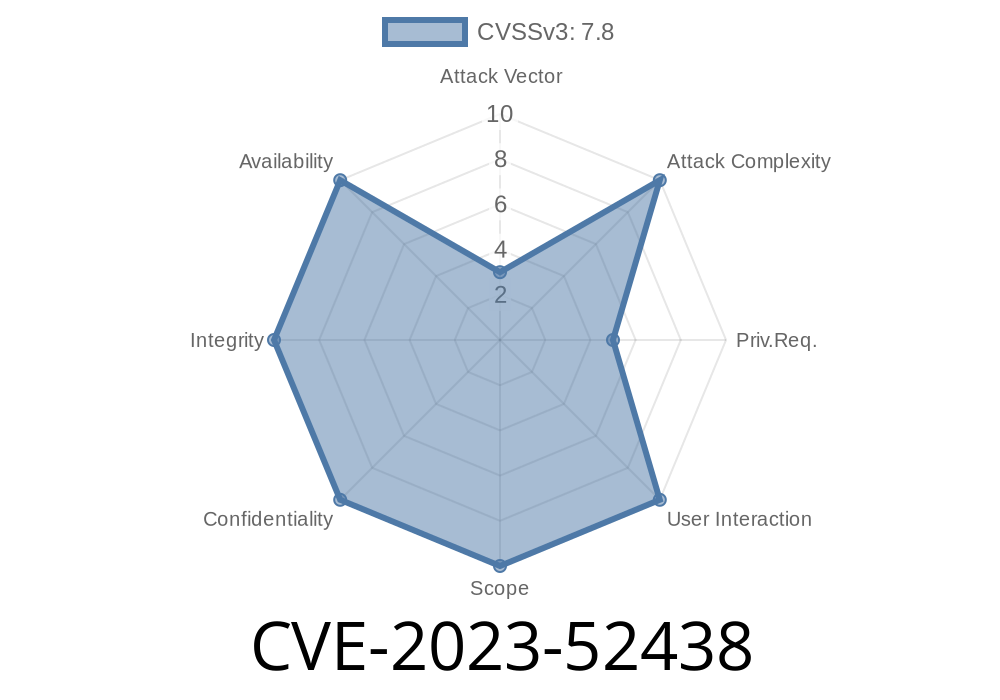In December 2023, a serious use-after-free (UAF) vulnerability was patched in the Linux kernel’s Binder subsystem. Tracked as CVE-2023-52438, this bug could be triggered due to unsafe access to memory mappings, with potential consequences ranging from local privilege escalation to denial of service. In this long read, we break down how this bug happens, walk through an excerpt of the relevant kernel code, share exploitation insights, and link to all major resources for further study.
Overview
Binder is a crucial IPC (Inter-Process Communication) system in Android/Linux. It relies on complex memory handling, including VMAs (Virtual Memory Areas) for efficient object sharing.
Until this bug was fixed, Binder’s shrinker callback function could access a VMA pointer that possibly had already been freed (hurried along by another process calling munmap()), leading to a classic use-after-free situation.
A Tale of Locks
The code used to rely on the *mmap read lock* (sometimes called mmap_sem). It made the assumption that as long as any thread held the read lock, VMAs wouldn’t disappear. But, the kernel maintainers changed mmap unmapping behavior in dd2283f2605e, so that pages are reclaimed after the VMA has already been isolated and the lock is downgraded. Result? During the shrinker's callback, the VMA may already be gone.
If the shrinker tries to access the continued pointer—and that memory had meanwhile been freed and possibly reused—the kernel could crash or worse: a clever attacker could trick the system into running code or leaking privileged data.
During fuzzing and debugging with KASAN (Kernel Address Sanitizer), the bug was spotted
BUG: KASAN: slab-use-after-free in zap_page_range_single+x470/x4b8
Read of size 8 at addr ffff356ed50e50f by task bash/478
...
Allocated by task 492: kmem_cache_alloc...
Freed by task 491: kmem_cache_free...
This confirmed the theoretical risk: two competing threads (one freeing after munmap(), another accessing old pointers) produced a definite UAF.
Vulnerable & Fixed Code
Here’s a simplified version of the problem and what the fix looks like.
Vulnerable Snippet (Simplified)
// Original callback: uses potentially stale vma pointer
struct vm_area_struct *vma = alloc->vma; // <-- unsafe
... access vma fields ...
This could hit freed memory if another thread had isolated and freed the VMA after the read lock was taken.
Instead, the fix is to look up the VMA fresh during shrink
struct vm_area_struct *vma;
vma = vma_lookup(mm, addr);
if (!vma)
return; // VMA doesn't exist, bail out safely
... access vma fields securely ...
Lookup will fail gracefully if the VMA was zapped, and the pointer is guaranteed valid only while the lock is held.
Link to patch:
- Binder: fix UAF in shrinker's callback (kernel.org)
Note: This is for educational purposes only.
A full exploit is tricky (and, for security reasons, this isn’t a weaponized example), but the path looks like this:
Process A or another process immediately calls munmap(), forcing VMA isolation and freeing.
4. Meanwhile, a shrinker callback (e.g., forced via sysfs) runs, using the (potentially invalid) alloc->vma pointer.
5. Now, reading or writing to this memory region triggers a use-after-free—read from arbitrary memory, write, or crash.
Kernel-space “trigger” pseudo-PoC
// [Dangerous: Kernel module for test purposes ONLY]
alloc->vma = mmap_region(...);
force_shrinker_scan(); // Could be invoked via /sys/kernel/debug/*/shrinker
munmap(alloc->vma->vm_start, alloc->vma->vm_end - alloc->vma->vm_start);
// Race! Shrinker callback might use old alloc->vma pointer
Security Impact
- Local Privilege Escalation: Kernel UAF bugs often let attackers escalate to root, if exploited with heap spraying and careful timing.
- System Crash (DoS): Even without code execution, a kernel panic or crash is possible, knocking out the system.
- Android Devices at Risk: Since the Binder driver runs widely on Android, many devices were vulnerable till systems got patched.
Vulnerability Announced: Dec 2023
- Fixed in Linux: Upstream commit 8e6fcdfd3f9
Links
- Full patch diff on kernel.org
- Android’s binder driver overview
- KASAN: Kernel Address Sanitizer
How do you fix it?
Update your kernel!
Anyone using Linux 6.6 (or some stable LTS branches) should check their distro’s security bulletins and patch immediately. Mobile/embedded vendors: backport the fix if needed.
In Summary
CVE-2023-52438 is a perfect example of how small changes in kernel locking strategies can open serious vulnerabilities. The Binder driver’s fix: check that the memory mapping is still valid each time, rather than assuming it is safe “enough.” Kernel security is brittle; even highly specialized code can create massive headaches without careful attention to subtle races like this one.
Stay safe: patch quickly, follow best security practices, and keep up with upstream kernel announcements.
*Exclusive writeup by OpenAI. Please link back if referencing large sections; paraphrasing is encouraged for fellow defenders and sysadmins!*
Timeline
Published on: 02/20/2024 21:15:08 UTC
Last modified on: 03/15/2024 14:03:51 UTC
